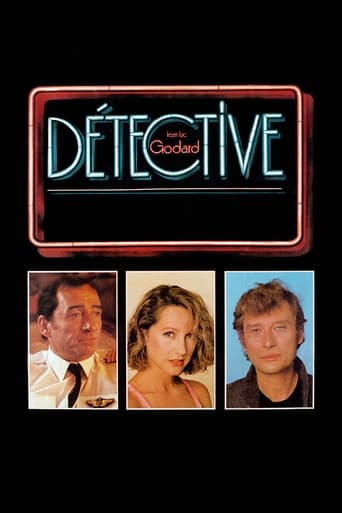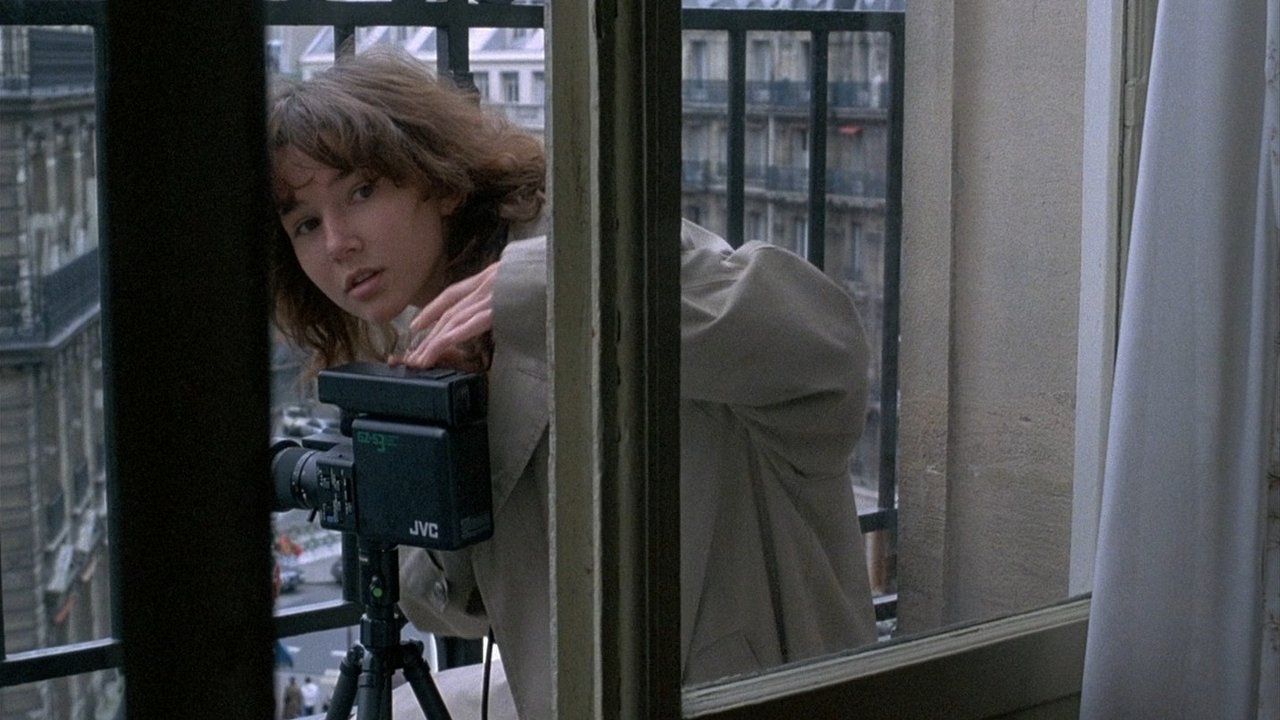MisterWhiplash
I'm not very admirable of Jean-Luc Godard's body of work on the whole after the mid 1970s. It may be snobbish to say this, or maybe I just don't "get" films like Hail Mary or Nouvelle Vague or In Praise of Love (though the last one does have its moments), but after the 1960s, going slowly at first into the 70s and then finally becoming all too apparent in the 80s, Godard lost something that made his films so special beforehand. He could put so much of his experimentation and poetry and quotations and little tics and oddities that made him such an iconoclast *and* make them entertaining and even sometimes, when warranted, have an actual story somewhere in the inspired chaos of his direction. But in looking at something like Hail Mary or King Lear or even Passion it's all a lot of less-than-half baked ideas, overlong shots of beaches, and generally boring semantics. This, sadly, is a chunk of what happened to a Godard running on steam from his glory years as an auteur.This ranting and castigating said, Godard does have some moments in this period that are striking and memorable and solid cinema; the best being First Name: Carmen and, most recently as what is at the moment his final feature film, Notre Musique. Detective, also, is one of them, if also sometimes a little shaky and awkward going between the rigorous attention to having characters real out of books and looking or acting unrealistic or in one-note tones as well as a solid B-movie plot. The latter concerns a detective (I believe played by Jean-Pierre Leaud, who does a great job going between serious and comedy in his first Godard film since La Gai Savoir) snooping around a hotel trying to find out about the death of "The Price", while at the same time a boxing promoter is getting into some heat with some over-paid debts, and at the same time sleeping with the mafioso's wife (I think this last part, hopefully I'm clear on this point).Luckily, Godard, working under a "Commercial" framework- ironic considering that this is commercial when compared to everything else Godard was doing at the time and made this in order to make the "controversial" Hail Mary- is able to slip in some funny and cool and actually engaging bits of dialog and quotes and ruminations by characters, and he's able to tag a hold of the plot a bit too. He also understands the jokey-ness of doing an homage to gangster and boxing pictures of the noir era in full color, without a clear narrative thread all of the time, and plays around with it, successfully. This doesn't make it automatically a great picture or as daring precisely as his earlier work. But it is a good sign; sometimes, perhaps, a director like Godard needs an Alain Sarde to reel him in just a tad and then the collaboration works out better as opposed to... King Lear.
Graham Greene
THEME: A murder in a hotel room. Who was killed and why? And by who? Is it past or present? And does it even matter? Three characters are detectives watching the story unfold and interacting with it, much like we, the audience. They piece together the clues to a story that eventually becomes their own; folding between the facts of a crime committed two years ago that repeats itself within the film and eventually leads both us and them towards the actions of the film's final act. It's subtle, but presented in Godard's typical style that many seem to have a problem with. DECONSTRUCTION #1: Here we have a detective film about detective films and about the relationship in such films between the characters and the audience. So we have ourselves represented by Laurent Terzieff, Aurelle Doazan and Jean-Pierre Léaud, who hide out in a cramped hotel room and observe the entrance of the building with the aid of small video camera which presents the image back again on a TV monitor.CINEMA: If you're familiar with Godard's work then such devises should be recognisable, with the film using the clichés of detective cinema as window-dressing to express greater themes on the notions of relationships, as well as the role of cinema itself. We also have the self-referential aspect suggested by the opening shot, in which the scene that we are looking at and hear commentary on turns out to be something that has already happened, played back from the detective's surveillance video. We also have the notion of film as a background cacophony, with a number of scenes taking place in rooms where television sets conspire to distract us from the action at hand. DECONSTRUCTION #2: Three characters caught up in the clichés of a post-war crime picture, with a secondary plot about money and a farcical plan from both sides to double-cross the Mafia and each other. Does it matter? Yes and no. I disagree with the first reviewer who claims that this film is something of a throwaway in Godard's career; one that puts formal experimentation over content and theme. The plot is silly, but it's silly for a reason and goes back to Godard's earliest film, À bout de soufflé (1960), in which he played with the codes and conventions of American gangster cinema in a way that was progressive and entirely deconstructive.ACTEURS: The film works as a result of the perfect casting. In fact, I'd say that the acting in this film is far better than any other film of Godard's that I have seen, and I've seen 25 of them. Léaud is obviously something of a regular in the films of Godard and his manic energy and uncomplicated air of boyish precociousness as this mysterious detective - trying to piece together a murder that may have happened or may be about to happen - is as bright as it was in films like Masculin, féminin (1966) and La Chinoise (1967). Likewise, Nathalie Baye, familiar from the director's earlier, more experimental feature Sauve qui peut (la vie) (1980) gives one of her best performances as a despondent housewife caught between two men as she tries to retrieve money to start a new life, but remains unsure of which man to draw allegiance to. The two men are boxing promoter and American cinema construct Johnny Hallyday, who breezes through the film chain-smoking and shooting pool as gangsters and cops threaten his plans from both sides, and Claude Brasseur, a pilot and the husband of Baye's character, once again, desperate to play both sides off against one another for the benefit of financial gain.DECONSTRUCTION #3: Once again, we have Godard reducing the characters to meagre iconographic constructs that are placed in a knowingly cinematic environment that is continually challenged by the director's experimentations with content and form. Despite this however, the characters remain likable, intelligent and recognisable, with the convincing performances from the incredibly talented cast managing to compete with the cold, deconstructive formality that Godard strives for in his presentation. L'ARGENT: A film made for financial gain about financial gain, or at least, the promise of such. According to film critic Colin McCabe, Détective (1985) was produced as a favour to Alain Sarde so as to secure the funding for the director's dream project - the subsequent 'Je vous salue, Marie' (1985) - and this notion of desperation, and the wanton pursuit of money is almost self-referential in design. CRITIQUE: I honestly can't understand why so many admirers of Godard's work found this film disengaging. If you're already familiar with Godard's characteristic approach to cinema, then half of the work is already done. For me, the film was rich in character and ideas, and intelligently put together in a way that made the viewing of the film interesting and unique.GODARD: Many would have you believe that Godard peaked in 1967, but this simply isn't the case. He's produced many fine films - Détective included - that require patience and perception on the part of the audience, and all released post-1980. This particular film might be considered a throwaway work by many Godard fans, but I would politely disagree. Like his best work, Détective is filled with ideas and a sharp commentary on the nature of cinema and the relationship between the director, the film, the characters and the audience. It does take work, but I feel that the work is worth it when we're dealing with something as interesting and progressive as this; with Godard throwing in all sorts of little jokes and observations (the detective as Prospero, aided by a character named Ariel, and with Léaud as the comic personification of Caliban, who eventually overcomes his master), whilst simultaneously turning in one of his most radical and well-rounded deconstructions on the nature of film and film viewing.
Stevenzzz
Like zetes stated, this was supposed to be Godard's "commercial" movie. However, it actually feels like his least commercial film of the ones released since 1980. Ever the prankster, Godard stocks the film to the brim with pratfalls, movie quotes and other allusions.It's hard to imagine how it is watching this in the theater. The film is so multi-layered that it's impossible to take in at one time. I'm not sure what his stance is on the home video vs. theater debate. A movie so dense with quotes is almost destined to be better viewed at home. There are multiple scenes where if you pay attention to one thing, you wind up missing some other detail. Even after multiple viewings. I had to watch this more times than any of the other Godard film currently in print just to make sure I caught enough of the details. As awesome technically as the film is, it somehow feels like a rehash of what he already did with First Name Carmen, Passion and Hail Mary. The fact that this was a commission may mean his heart wasn't quite in it. You could never accuse him of that with most of his other films.
Teekannu
This movie is said to have been filmed by Godard on commission from producer Alain Sarde, but it's by no means your ordinary "commissioned movie":it does boast a cast with well-known stars (at least in France) and it retains all the crime movie's stereotypes ( as gangsters, guns, boxers, girls, moneys changing hands...), but all of them are put together in a unique and mesmerizing way. Think of those exploded views you sometimes find in technical magazines: more often than not you can hardly tell what the represented object is supposed to be, nevertheless you always lose yourself gazing at those craftily drawn little pieces, until the object itself is deprived of any functional meaning and become only a sheer, pure sign. Though it's still possible to keep track of the plot and to draw something like a sequential chain going through the scenes, doing so is the best way to miss what this movie have really to offer: a collection of beautifully shot "vignettes", varying from amusing (Jean-Pierre Léaud freaking out in various disguises) to sublime (the "breast boxing" scene), each one to be tasted as a separate entity. There are plenty of quotes from books and other movies too, to the entertainment of the most encyclopedic among the audience (not that these quotes are introduced in the most subtle way: often the characters reads them from the actual books and you can easy spot the titles on screen! ) . Let's face it: it may be not a masterpiece, since sometimes the screenplay seems to have been conceived with the only aim of pushing you away from the screen, but the persevering viewer will be rewarded with some endearing little gems.



 AD
AD



